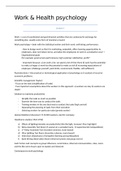College aantekeningen
Work & Health Psychology (761004-B-6)
- Instelling
- Tilburg University (UVT)
Compact but clear notes on the course Work and Health Psychology (tilburg university). Passed the frist time because of the extensive, self-made notes on all lectures. Lots of concepts and theories to study. I am doing year 2 of the bachelor Human Resource Management.
[Meer zien]




